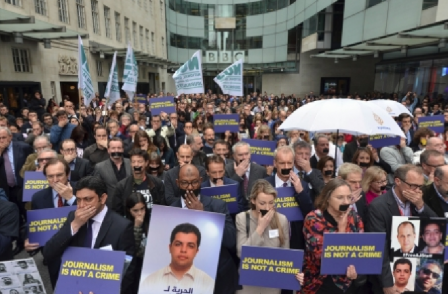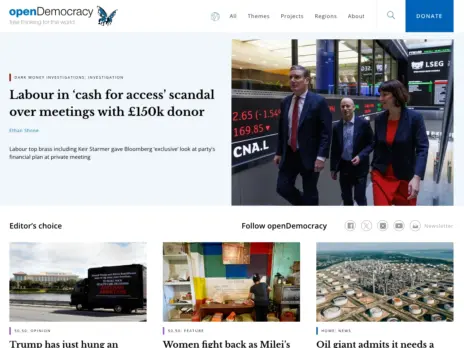
It seems that the cry ‘journalism is not a crime’ is everywhere. Turkey’s use of anti-terror laws to arrest two British journalists (and their local ‘fixer’) working for Vice sparked a wave of online protests and petitions.
Even the Tory government warned the Turkish authorities that "Respect for freedom of expression and the right of media to operate without restriction are fundamental in any democratic society". This followed global protests over the conviction in Egypt of three Al jazeera journalists who were, as campaigners pointed out, "simply doing their jobs".
Of course we must insist that journalism is not a crime in Turkey, Egypt or any other repressive state. But we should also insist that journalism not be deemed a crime in the UK or any other supposedly free society. Indeed fighting for press freedom on our own doorsteps should surely be the priority. After all, we might actually make a difference here.
Strangely, however, over the past four years the UK authorities’ attempts to criminalise popular journalism, involving the arrest of dozens of tabloid journalists, have attracted almost no protests from the civil liberties lobby. Meanwhile the same UK government and opposition parties now lecturing the Turks about media freedom have sought to impose the first system of state-backed regulation of the press since the system of Crown licensing ended more than 300 years ago.
While attention focused on detained Vice reporters Jake Hanrahan and Philip Pendlebury last week, another British journalist arrested ‘simply for doing their job’ was making somewhat smaller headlines. Press Gazette announced that Graham Dudman, former managing editor of the Sun, had left the paper in the wake of his three-and-a-half year ordeal at the hands of the Metropolitan Police and the Crown Prosecution Service under Operation Elveden.
Dudman was caught up in the British state crusade against tabloid journalism that nobody wants to talk about. After the phone-hacking scandal exploded in the summer of 2011, the Met launched three major investigations into the UK tabloid press. Involving 200 officers, these operations amount to the biggest criminal investigation in British police history.
It proved to be the most extraordinary state crackdown on a supposedly free press in a modern Western society. Police treated tabloid journalists more like suspected jihadists, arresting more than 60 who worked for the Rupert Murdoch-owned Sun and News of the World (which had closed in July 2011), many in floorboard-ripping dawn raids on their family homes. Ten police officers raided Graham Dudman’s home in January 2012, and hauled him off to the cells in front of his wife and two young children.
Like many others, he spent 19 months in limbo on police bail – which stopped him working as a journalist as surely as if he had been locked up. Eventually, in October 2014, Dudman went on trial charged with "conspiracy to commit misconduct in public office". The jury cleared him of two of the four charges. He was left facing a retrial on the others this month. But in April, humiliated by juries refusing to convict journalists for doing their jobs, the CPS dropped the remaining charges against Graham and eight others.
Dudman had been arrested under Operation Elveden, the Met’s huge investigation into tabloid newspapers allegedly paying public employees for information. To pursue Eleveden, the UK authorities effectively made up a law specifically aimed at journalists.
Prosecutors dusted off a thirteenth-century common law which made "misconduct in public office" a crime. Then they gave it a modern twist by adding on the previously unheard-of offence of "conspiracy to commit misconduct in public office", which allowed them to prosecute journalists who are not public employees at all.
This nonsensical new law aimed to criminalise the normal practice of reporters searching for inside information and trying to expose stories that the secrecy-obsessed authorities want hidden. Like the foreign governments they see fit to lecture about media freedom, the British authorities wanted to convict and potentially jail reporters for doing their jobs.
Yet there were few political protests over this witch-hunt. When I wrote a Spiked feature about the ongoing legal battles two years ago, Graham Dudman summed up the prevailing attitude (anonymously at the time, as he was still on police bail):
If this was happening in Zimbabwe, China or North Korea, there would be a shit-storm of opposition here – protests outside the embassies, the NUJ would be on its high horse, all that. But if it’s British redtop journalists working for Rupert Murdoch? naa, fuck ’em.
When the big trials of these tabloid journalists finally started in 2014, jurors showed they did not necessarily share the political elite’s fear and loathing of popular journalism – what one top prosecutor called, in open court with open contempt, the "gutter press". When the charges against Dudman and others were dropped in April 2015, only one of the 34 journalists arrested under Elveden stood convicted. Of the 22 Sun journalists arrested in all the Met’s operations, two have been convicted with two more still facing a retrial.
Announcing his decision to leave the Sun last week, Dudman thanked "some fantastic people at News UK who have been incredibly supportive during the past three and a half years", and his legal team. He did not thank any civil liberties campaigners. That is hardly surprising.
Many of those now waving "journalism is a not a crime" banners have been at best spectators and at worst cheerleaders for the UK state’s attempt to tame and criminalise tabloid journalism. The BBC and other sections of the liberal media could barely disguise their bitter frustration at the acquittals by juries.
Britain is plagued by a civil liberties lobby that puts far more emphasis on the ‘civil’ than the ‘liberties’. They want press freedom for respectable, liberal publications, high-minded commentators and brave reporters working in war zones. Not for uncouth tabloid hacks.
Yet feedom of speech and of the press are indivisible liberties that we defend for all or none at all. The point about a free press is that is must be free to publish and be damned. Those who try instead to treat that that right as a privilege endanger our most precious liberty.
Like they used to say about charity, press freedom begins at home. Unlike charity, however, freedom of speech and of the press are not gifts to be handed down from above to the deserving. They are liberties that were hard won in the past and must be defended again in the present.
"As I leave", Graham Dudman said last week, "my thoughts are with two Sun colleagues as they prepare for their retrial later this month. Please continue to offer them both as much support as possible."
What chance of seeing those "journalism is not a crime" placards outside the Old Bailey?
Mick Hume’s new book “Trigger Warning: is the fear of being offensive killing free speech?” is published by William Collins (and available from Amazon).
Email pged@pressgazette.co.uk to point out mistakes, provide story tips or send in a letter for publication on our "Letters Page" blog






